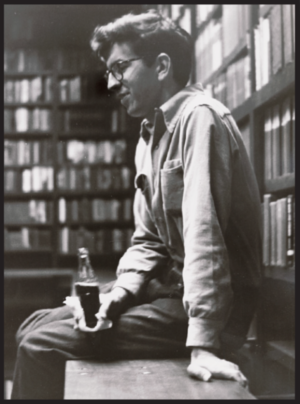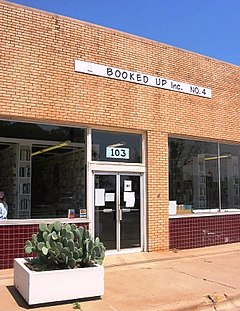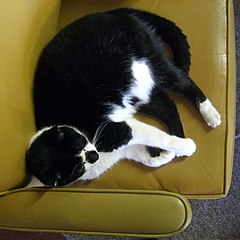Larry McMurtry
Larry Jeff McMurtry (Jun. 3, 1936 - Mar. 25, 2021) was a prolific American novelist of books about the U.S. Old West, many of which were adapted to film or TV.[1] His novels Horseman, Pass By (1962), The Last Picture Show (1966), and Terms of Endearment (1975) were all adapted into films. Films adapted from McMurtry works won 13 Oscar Awards (and 34 nominations). His 1985, McMurtry's Pulitzer Prize-winning novel Lonesome Dove was adapted into a television miniseries that won 7 Emmy Awards (and 18 nominations). The subsequent three novels in his Lonesome Dove series were adapted as three more miniseries, earning eight more Emmy nominations. In 2005, McMurtry co-wrote, with Diana Ossana, the screen play of the film Brokeback Mountain, adapted from a short story by E. Annie Proulx.[2] In 2014, McMurtry received the National Humanities Medal.[3]
See the list of his writings.
In Tracy Daugherty's 2023 biography of McMurtry, the biographer quotes critic Dave Hickey as saying about McMurtry's copious body of work:
"Larry is a writer, and it's kind of like being a critter. If you leave a cow alone, he'll eat grass. If you leave Larry alone, he'll write books. When he's in public, he may say hello and goodbye, but otherwise he is just resting, getting ready to go write."[4]
Personal life
In 1936, McMurtry was born in Wichita Falls, Texas, and he grew up on his parents' ranch outside Archer City, Texas. The city was the model for the town of Thalia, which is a setting for much of his fiction.[5] In his memoir, McMurtry said that during his first five or six years in his grandfather's ranch house, there were no books, but his extended family would sit on the front porch every night and tell stories. In 1942, McMurtry's cousin Robert Hilburn stopped by the ranch house on his way to enlist for World War II and left a box containing 19 boys' adventure books from the 1930s. The first book he read was Sergeant Silk: The Prairie Scout.[6]
McMurtry earned a BA from the University of North Texas in 1958 and an MA from Rice University in 1960.
In 1959, McMurtry married Jo Scott, an English professor who authored five books.[7] They separated in 1964 and divorced in 1966, but before divorcing, they had a son together, James McMurtry. Both James and his son (Larry's grandson, Curtis McMurtry) are singer/songwriters and guitarists.[8]
In 1991, McMurtry underwent heart surgery.[9] During his recovery, he suffered severe depression. He recovered at the home of his future writing partner Diana Ossana and wrote his novel Streets of Laredo at her kitchen counter.[10][11]
In 2011, McMurtry married Norma Faye Kesey, the widow of writer Ken Kesey, in a civil ceremony in Archer City, Texas.[12] McMurtry died in 2021 at his home in Archer City. He was 84 years old.[13]
In early 2023, it was announced that McMurtry's personal property, including his writing desk, typewriters, and personal book collection, would be sold at public auction by Vogt Auction in San Antonio, Texas, on May 29, 2023.[14]
Career
Writer
During the 1960–1961 academic year, McMurtry was a Wallace Stegner Fellow at the Stanford University Creative Writing Center, where he studied the craft of fiction under Frank O'Connor and Malcolm Cowley,[15] alongside other aspiring writers, including Wendell Berry, Ken Kesey, Peter S. Beagle, and Gurney Norman. Wallace Stegner was on sabbatical in Europe during McMurtry's fellowship year.[16]
McMurtry and Kesey remained friends after McMurtry left California and returned to Texas to take a year-long composition instructorship at Texas Christian University.[17] In 1963, he returned to Rice University, where he served as a lecturer in English until 1969, and a visiting professor at George Mason College (1970) and American University (1970–71). [18] He entertained some of his early students with accounts of Hollywood and the filming of Hud, for which he was consulting. In 1964, Kesey and his Merry Pranksters conducted their noted cross-country trip, stopping at McMurtry's home in Houston. The adventure in the day-glo-painted school bus Furthur was chronicled by Tom Wolfe in his book The Electric Kool-Aid Acid Test. That same year, McMurtry was awarded a Guggenheim Fellowship.[19]
McMurtry won numerous awards from the Texas Institute of Letters: three times the Jesse H. Jones Award—in 1962, for Horseman, Pass By; in 1967, for The Last Picture Show, which he shared with Tom Pendleton's The Iron Orchard; and in 1986, for Lonesome Dove. He won the Amon G. Carter award for periodical prose in 1966 for Texas: Good Times Gone or Here Again?[20] and the Lon Tinkle Award for Lifetime Achievement in 1984.[21] In 1986, McMurtry received the annual Peggy V. Helmerich Distinguished Author Award from the Tulsa Library Trust.[22] He reflected on his 1985 Pulitzer Prize-winning novel, Lonesome Dove, in Literary Life: A Second Memoir (2009), writing that it was the "Gone With the Wind of the West … a pretty good book; it's not a towering masterpiece."[23]
McMurtry described his method for writing novels in Books: A Memoir. He said that from his first novel on, he would get up early and dash off five pages of narrative. When he published the memoir in 2008, he said this was still his method, although by then, he wrote 10 pages a day. He also wrote every day, ignoring holidays and weekends.[24] McMurtry was a regular contributor to The New York Review of Books.[25]
McMurtry was a vigorous defender of free speech and, while serving as president of PEN American Center (now PEN America) from 1989 to 1991, led the organization's efforts to support writer Salman Rushdie,[26] whose novel The Satanic Verses (1988) caused a major controversy among some Muslims, with the Supreme Leader of Iran, Ayatollah Ruhollah Khomeini, issuing a fatwā calling for Rushdie's assassination, after which attempts were made on his life.[27]
In 1989, McMurtry testified on behalf of PEN America before the U.S. Congress in opposition to immigration rules in the 1952 McCarran–Walter Act that for decades permitted the visa denial and deportation of foreign writers for ideological reasons.[23] He recounted how before PEN America was to host the 1986 International PEN Congress, "there was a serious question as to whether such a meeting could in fact take place in this country... the McCarran–Walter Act could have effectively prevented such a gathering in the United States." He denounced the relevant rules as "an affront to all who cherish the constitutional guarantees of freedom of expression and association. To a writer whose living depends upon the uninhibited interchange of ideas and experiences, these provisions are especially appalling." Subsequently, some provisions that excluded certain classes of immigrants based on their political beliefs were revoked by the Immigration Act of 1990.[28]
Antiquarian bookstores
While at Stanford, McMurtry became a rare-book scout.[29] During his years in Houston, he managed a book store called the Bookman. In 1969, he moved to the Washington, D.C., area. In 1970 with two partners, he started a bookshop in Georgetown, which he named Booked Up. In 1988, he opened another Booked Up in Archer City. It became one of the largest antiquarian bookstores in the United States, carrying between 400,000 and 450,000 titles. Citing economic pressures from Internet bookselling, McMurtry came close to shutting down the Archer City store in 2005, but chose to keep it open after great public support.
In early 2012, McMurtry decided to downsize and sell off the greater portion of his inventory. He felt the collection was a liability for his heirs.[30] The auction was conducted on August 10 and 11, 2012, and was overseen by Addison and Sarova Auctioneers of Macon, Georgia. This epic book auction sold books by the shelf, and was billed as "The Last Booksale", in keeping with the title of McMurtry's The Last Picture Show. Dealers, collectors, and gawkers came out en masse from all over the country to witness this historic auction. As stated by McMurtry on the weekend of the sale, "I've never seen that many people lined up in Archer City, and I'm sure I never will again."[31]
In April 2006, McMurtry was elected a member of the American Antiquarian Society.[32]
Film and television
McMurtry became well known for the film adaptations of his work, which were seen by many viewers, especially Hud (from the novel Horseman, Pass By), starring Paul Newman and Patricia Neal;[33] the Peter Bogdanovich–directed The Last Picture Show;[34] James L. Brooks's Terms of Endearment, which won five Academy Awards, including Best Picture (1984);[35] and Lonesome Dove, which became a popular television miniseries starring Tommy Lee Jones and Robert Duvall.[36][37]
In 2006, he was co-winner (with Diana Ossana) of both the Best Screenplay Golden Globe[38] and the Academy Award for Best Adapted Screenplay for Brokeback Mountain, adapted from a short story by E. Annie Proulx. He accepted his Oscar while wearing a dinner jacket over jeans and cowboy boots.[39] In his speech, he promoted books, reminding the audience the movie was developed from a short story. In his Golden Globe acceptance speech, he paid tribute to his Swiss-made Hermes 3000 typewriter.[40]
Awards
- AcademyAwardBestAdaptedScreenplay 2001–2020
- AARP Movies for Grownups Award for Best Screenwriter
- Austin Film Critics Association Award for Best Adapted Screenplay
- BAFTA Award for Best Screenplay
- BAFTA Award for Best Adapted Screenplay 2000–2019
- Dallas–Fort Worth Film Critics Association Award for Best Screenplay
- Florida Film Critics Circle Award for Best Screenplay
- GoldenGlobeBestScreenplayMotionPicture 2001–2020
- New York Film Critics Circle Award for Best Screenplay
- Online Film Critics Society Award for Best Adapted Screenplay
- PulitzerPrize Fiction 1976–2000
- St. Louis Gateway Film Critics Association Award for Best Screenplay
- Writers Guild of America Award for Best Adapted Screenplay
Provenance
- Some content on this page may previously have appeared on Wikipedia.
References
- ↑ Hugh Rawson, "Screenings," American Heritage, April/May 2006.
- ↑ McMurtry, Larry 1936–. Contemporary Authors, New Revision Series. Encyclopedia.com.
- ↑ Larry McMurtry National Humanities Medal 2014, at The National Endowment for the Humanities
- ↑ Larry McMurtry: A Life by Tracy Daugherty, New York: St. Martin's Press, 2023, page 201. ISBN 978-1-250-28233-0. (A note at the end of this biography indicates that the quote may have originally come from A Book on the Making of Lonesome Dove by John Spong, Jeff Wilson, and Bill Wittliff, Austin: University of Texas Press, 2012, p31).
- ↑ New Life After 'The Last Picture Show', The New York Times, April 4, 1982.
- ↑ McMurtry, Larry (2008). Books: A Memoir, 1–8.
- ↑ Larry McMurtry: An Accidental Feminist? (en).
- ↑ Texas literary giant Larry McMurtry dies at 84, The Dallas Morning News, March 26, 2021. (in en)
- ↑ 'Lonesome Dove' Legend Larry McMurtry on Fiction, Money, Womanizing, and Old Age (May 22, 2014).
- ↑ Larry McMurtry, one of Texas' greatest writers, dead at 84 - ABC11 Raleigh-Durham (March 26, 2021).
- ↑ Larry McMurtry's Dream Job (December 7, 1997).
- ↑ Granberry, Michael. Author Larry McMurtry marries Ken Kesey's widow, The Dallas Morning News, May 5, 2011.
- ↑ Garner, Dwight. Larry McMurtry, Novelist of the American West, Dies at 84, The New York Times, March 26, 2021. (in en-US) Template:Cbignore
- ↑ Marini, Richard A. (2023-02-07). Larry McMurtry auction includes signed books, desk, typewriter, boots (en-US).
- ↑ Novelist Larry McMurtry's last kind words: "Lonesome Dove" author on closeted cowboys, pointless Pulitzers, and his latest Old West novel.. Mother Jones (May 2014).
- ↑ On the Road by Larry McMurtry in The New York Review (Magazine), Dec. 5, 2002.
- ↑ A Guide to the Larry McMurtry Papers, 1968, 1987–1991 (en). The Witcliff Collections.
- ↑ Guide to the Larry McMurtry and Diana Osanna Papers, 1890–2008, bulk dates 1980-2008 MS 276 (en). Woodson Research Center.
- ↑ John Simon Guggenheim Foundation: Larry McMurtry. John Simon Guggenheim Memorial Foundation.
- ↑ Texas Institute of Letters: Awards. Texas Institute of Letters.
- ↑ Texas Institute of Letters: Literary Awards. Texas Institute of Letters.
- ↑ Peggy V. Helmerich Distinguished Author Award. Tulsa Library Trust.
- ↑ 23.0 23.1 Flood, Alison (March 27, 2021). Lonesome Dove author and Brokeback Mountain screenwriter Larry McMurtry dies at 84. The Guardian.
- ↑ (2008) Books : a memoir, 1st Simon & Schuster hardcover. New York: Simon & Schuster. ISBN 9781416583349.
- ↑ {{Cite web |title=Larry McMurtry |work=[[The New York Review] |access-date=March 27, 2021 |url= https://www.nybooks.com/contributors/larry-mcmurtry/ }}
- ↑ Larry McMurtry: Biographical Sketch. Harry Ransom Center at the University of Texas at Austin.
- ↑ Loyd, Anthony. Tomb of the unknown assassin reveals mission to kill Rushdie, The Times, June 8, 2005.
- ↑ PEN America Mourns Death of Novelist, Former PEN America President Larry McMurtry. PEN America (March 26, 2021).
- ↑ Working Book Bound, D Magazine, June 1985. (in en)
- ↑ Lindenberger, Michael. The Great Book Sale of Teas, August 15, 2012.
- ↑ Wanted, Dead or Alive: Used Books, The New York Times, August 12, 2012.
- ↑ MemberListP.
- ↑ Hud. OCLC 878940995.
- ↑ The last picture show. OCLC 79950037.
- ↑ The 56th Academy Awards; 1984.
- ↑ Lonesome Dove. OCLC 423140732.
- ↑ Lonesome Dove. OCLC 774391218.
- ↑ Brokeback Mountain: Interview with Larry McMurtry & Diana Ossana, Cinemalogue, February 14, 2006.
- ↑ Larry McMurtry, 'Lonesome Dove' Novelist, Dead at 84, March 26, 2021.
- ↑ What's so special about a Hermes 3000?, Chicago Tribune, January 20, 2006.



